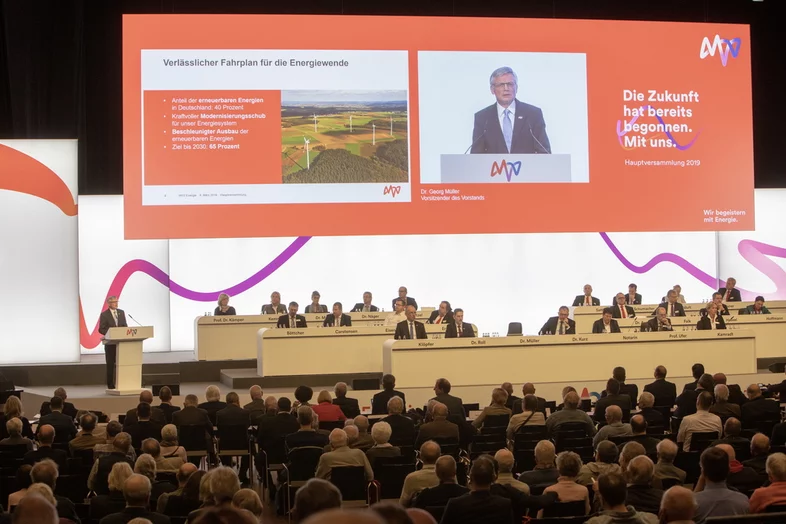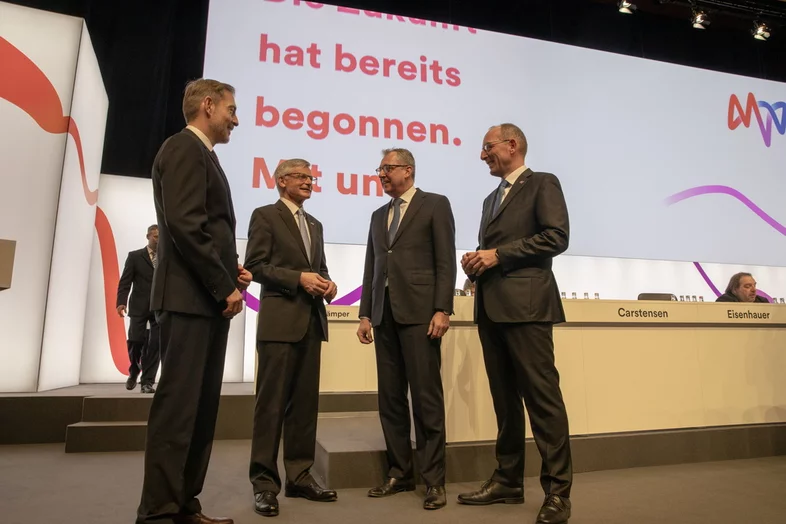MVV: District heating has a future
Mannheim energy player maintains focus on renewable energies, energy efficiency and innovative products and services – Coal exit compromise has to be turned into consensus within society – Forecast for 2019 confirmed
The Mannheim-based energy company MVV has called on all involved to meet the great responsibility they bear to work together to gain broad-based acceptance in politics, business and society as a whole, for the compromise found by the Federal Government’s “Growth, Structural Change and Employment” Commission on the exit from fossil energy generation and to build on this as a solid foundation for the energy turnaround. Speaking at the Annual General Meeting held on Friday in Mannheim, MVV’s CEO, Dr. Georg Müller, particularly appealed to the “critics on all sides – whether they think the compromise goes too far or not far enough”. This consensus now found should not be damaged or revoked. “No-one knows better than the energy industry how painful the consequences can be when decisions are taken without consensus and then followed up by inconsistent actions. The dithering approach to the exit from nuclear energy and the back and forth with renewables cost a great deal of trust, credibility, time and, yes, a lot of money. No-one wants to see a repetition of that”, stressed Dr. Georg Müller to an audience of nearly 1,300 shareholders and guests.
According to MVV’s CEO, an industrialised economy such as Germany that aimed to play a leading role today, tomorrow and beyond, would also have to spearhead developments when it came to protecting the climate and building the energy supply of the future. For this, politicians would now have to create the necessary legal framework with a reliable roadmap. This would have to focus on further expanding renewable energies and boosting energy efficiency. “We should not forget that the energy turnaround is not just a response to the challenges presented by global climate change”, he stressed. “It is also a powerful motor for modernising our energy system and our country.” Today, renewables accounted for around 40 percent of Germany’s power. The ambitious pace of developments in recent years had helped forward-looking technologies to achieve a breakthrough. “Despite all the deficiencies in the detail, the project as a whole has certainly been worthwhile.”
The company therefore welcomed the fact that, in its report, the Commission had confirmed the 65 percent renewables by 2030 target included in the Coalition Agreement between the CDU/CSU and SPD as the basis for its recommendations. “After all”, remarked Dr. Müller, “the speed of the coal exit will be determined by the pace at which renewable energies are expanded – not the other way round.” MVV itself increased the renewables share of its own electricity generation at fully consolidated companies to 63 percent in the past year. At the same time, the group of companies reduced its direct CO2 emissions by six percent.
Looking to the further expansion in renewables, onshore wind power would continue to play the key role in future as well. In view of this, MVV’s CEO referred to the special additional tenders announced to make up for the lower volumes of new renewable energies currently being added, itself the result of inappropriate tender terms with excessive privileging, as a first step for “the most important pillar of the energy turnaround”. This would now have to be supplemented by a regional quota to enable renewables to be built in southern Germany, and thus where electricity demand was at its highest. “This will also reduce the need for grid expansion, an area that is often referred to, and that unfairly and incorrectly, as presenting an obstacle to the further expansion.”
No energy turnaround without a heating turnaround
At the same time, MVV’s CEO warned once more against viewing the energy turnaround merely as a conversion in the electricity supply. “The electricity turnaround is one aspect – admittedly an important one. But heating energy is at least as important.” According to Dr. Müller, buildings alone accounted for more than 30 percent of end energy consumption. Particularly in large built-up areas, environmentally-friendly district heating was and would remain a key forward-looking technology, one that was indispensable for the future.
This meant that, for MVV, efficient combined heat and power generation still had a role to play. “It is not part of the problem, but part of the solution.” Having said that, the goal of decarbonisation also applied for heating energy. The CEO therefore referred to projects currently underway at the company to link up its own energy from waste plants in Mannheim and Leuna to regional district heating grids and thus make district heating more renewable and green. Dr. Müller: “District heating has a future, and one we are working on.”
Fourth consecutive year of earnings growth and stable outlook
The group of companies has managed to combine its strategy, which focuses on sustainably implementing the energy turnaround, with robust growth. In its past 2018 financial year (1 October 2017 – 30 September 2018), MVV increased its operating earnings (adjusted EBIT) for the fourth consecutive year already. Year-on-year, this figure rose by two percent to Euro 228 million. At just over Euro 3.9 billion, sales maintained the high level seen in recent years. For its bottom line, i.e. adjusted annual net income after minority interests, MVV reported Euro 94 million, slightly higher than in the previous year.
After the past four years of earnings growth, from an operating perspective the company now expects both its earnings and its sales to move sideways in the current 2019 financial year and can thus confirm the forecast issued in December. The CEO viewed this as representing “an ambitious target, and not one to be taken for granted” given the unsettled economic and political climate and the increasing volatility of the company’s own business.
High investments and consistent dividend
To this end, the Mannheim-based group of companies continues to invest substantial sums. In the past financial year, MVV invested a total of Euro 290 million, and thus around 50 percent more than in the previous year, in its existing and growth businesses. The company intends to increase this total by a further significant amount in the current year.
For the 2018 financial year, the Executive and Supervisory Boards have proposed a consistent dividend of 90 cents per share for approval by the Annual General Meeting. The distribution total should once again amount to Euro 59.3 million, with a distribution ratio of 63 percent. Dr. Müller: “These are convincing figures and bear comparison with third parties. Our share is and will remain a stable investment with a good return.”



